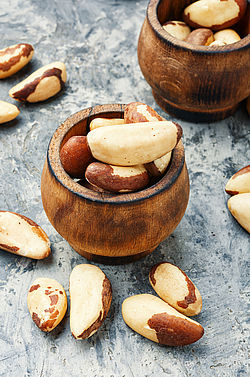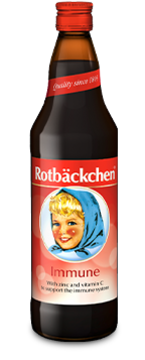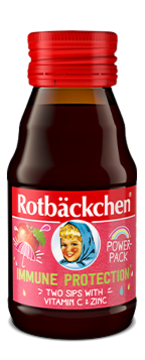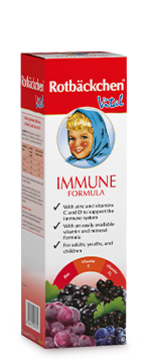Zinc
The trace element zinc plays a role in many of your body’s functions and well-being. For example, it contributes to a normal immune system and protects your cells from oxidative stress. Here, we will give you tips on managing your zinc supply.
Inhaltsverzeichnis
What exactly is zinc?

Zinc is one of the minerals. These are vital inorganic nutrients that the body cannot produce itself.
More precisely, zinc belongs to the essential trace elements. Trace elements only occur in the body in small quantities. Nevertheless, they are important, because without them important processes in the body do not function.
However, your body cannot produce zinc itself or store much of it. That is why you need to take it in regularly with your food.
Zinc - Effects & properties
![[Translate to Englisch:] Kleiner Junge spaziert auf dem Feld [Translate to Englisch:] Kleiner Junge spaziert auf dem Feld](https://www.rotbaeckchen.de/fileadmin/_processed_/c/e/csm_rotbaeckchen-zink-03_ecf13ed3ef.jpg)
The European Food Safety Authority (EFSA) determines what kind of statements about substances and their effects are permissible, based on scientific evidence. Here, zinc is special. While many substances have only a few permissible claims, zinc has 18 authorised claims about its effectiveness. The following effects have been documented for zinc:
- helps maintain normal skin
- contributes to normal protein synthesis
- helps maintain normal blood testosterone levels
- contributes to normal carbohydrate metabolism
- helps maintain normal hair
- contributes to the maintenance of normal nails
- contributes to a normal metabolism of macronutrients (fat, carbohydrates and protein)
- helps protect cells from oxidative stress
- contributes to normal fatty acid metabolism
- contributes to normal fertility and reproduction (reproductive capacity)
- contributes to normal cognitive function
- contributes to normal immune system function (physical defence)
- contributes to preservation of normal bones
- contributes to normal acid-base metabolism
- helps maintain normal vision
- contributes to normal vitamin A metabolism
- contributes to normal DNA synthesis
- has a cell division function
Interaction with iron
Like vitamins, trace elements such as zinc sometimes interact with certain nutrients when they are taken. Taking zinc and iron at the same time can inhibit zinc absorption in the body. You can prevent this problem simply by taking these trace elements with a time delay.
Daily requirements & food with zinc
![[Translate to Englisch:] Mädchen knabbert an Maiskolben [Translate to Englisch:] Mädchen knabbert an Maiskolben](https://www.rotbaeckchen.de/fileadmin/_processed_/5/4/csm_rotbaeckchen-zink-01_b7849af06d.jpg)
Certain foods naturally contain significant amounts of zinc and can therefore be easily integrated into a balanced diet. Often, a healthy, balanced diet already covers the daily zinc requirement. These foods are good sources of zinc:
| Food | Per 100 g |
|---|---|
| Oysters | 22 mg |
| Wheat bran | 9.2 mg |
| Edam (30% fat in dry matter) | 5.3 mg |
| Beef shoulder | 5.2 mg |
| Oatmeal | 4.3 mg |
| Brazil nut | 4 mg |
| Prawn | 2.2 mg |
Average values according to Souci, Fachmann, Kraut: Food Composition and Nutrition Tables (7th ed.). Munich: C.H. Beck. 2008

Zinc intake depends not only on the zinc you intake through food, but also the “phytate” content of food. Phytate is a substance found in many pulses, for example, cereals or soya. It binds zinc, calcium or magnesium to itself and prevents the body utilising them.
Since 2019, the German Society for Nutrition (DGE) has indicated their zinc reference values on the amount of phytate ingested. The recommended daily zinc dose for children is stable. However, adults’ zinc requirements fluctuate depending on phytate intake.
| Group | Daily requirement – depending on phytate intake and gender |
|---|---|
| Children between 1 and 4 years | 3 mg |
| Children between 4 and 7 years | 4 mg |
| Children under 10 years | 6 mg |
| Children between 10 and 13 years | 8-9 mg |
| Men11-16 mg | |
| Women7-10 mg | |
| Pregnant and breastfeeding women7-14 mg |
The recommended values vary depending on phytate intake. Find the complete DGE tables here (in German).
The recommended values vary depending on phytate intake. Zinc is an important trace element. To stay healthy and functional, you need a regular supply through food. An unbalanced diet is the most common cause of zinc deficiency. However, preventing zinc deficiency is easy by a diet change.
Zinc intake made easy
With a balanced diet, you can often get enough zinc but it cannot be stored in large amounts. Children in particular do not need as much as adults. To maintain the prescribed daily dose, a healthy and balanced diet is recommended.
More about vitamins & nutrients

Vitamins & minerals
Want to know what all the valuable micronutrients do, what foods have them and how much you need? Find more information here.
Find out more
Vitamin C
This “ascorbic acid” is better known as vitamin C and is an essential component of a healthy and balanced diet. It is especially important for children to take in sufficient vitamin C.
Find out more
Iron
Iron is one of the most important trace elements in the body. It helps red blood-cell formation and is essential for transporting oxygen through the body. The right iron balance helps you and your family stay healthy.
Find out more


